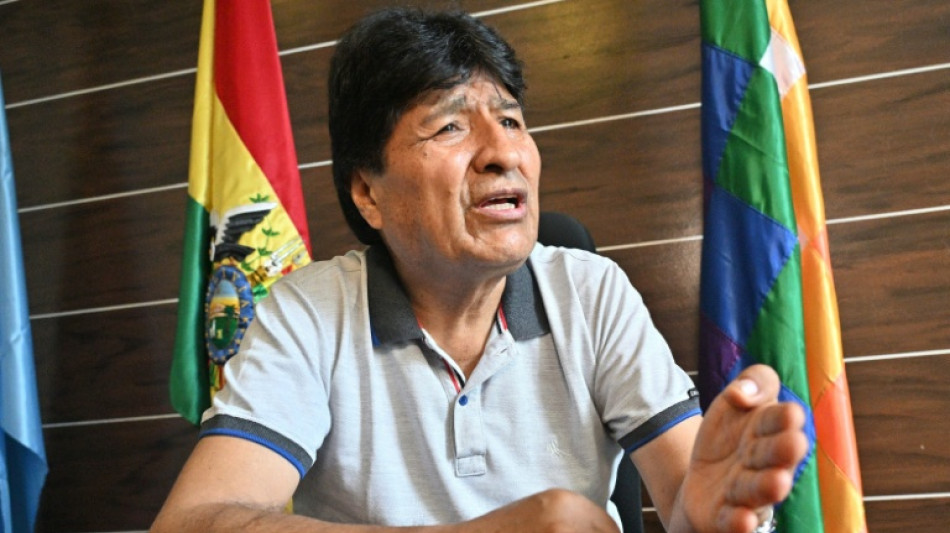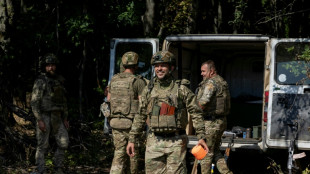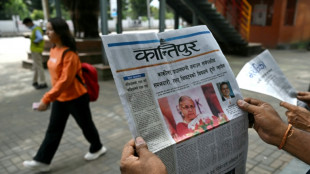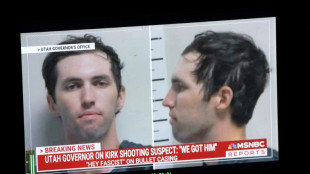
| RIO | -0.1% | 62.475 | $ | |
| CMSC | -0.09% | 24.357 | $ | |
| BCC | -3.27% | 86.19 | $ | |
| SCS | -0.59% | 16.9 | $ | |
| JRI | 0.4% | 14.176 | $ | |
| BTI | -1.7% | 56.353 | $ | |
| NGG | 0.44% | 71.387 | $ | |
| GSK | -1.82% | 40.74 | $ | |
| RBGPF | 0% | 77.27 | $ | |
| BCE | -1.02% | 24.055 | $ | |
| RYCEF | 3.03% | 15.19 | $ | |
| VOD | -0.17% | 11.84 | $ | |
| AZN | -2.21% | 79.35 | $ | |
| CMSD | -0.03% | 24.382 | $ | |
| RELX | 0.58% | 46.6 | $ | |
| BP | -1.04% | 34.115 | $ |
Morales vows no surrender in bid to reclaim Bolivian presidency

Bolivia's ex-leader Evo Morales has told AFP he will not back down in his bid to regain power, despite being dogged by allegations of abusing a minor and being barred from seeking a fourth term.
In an interview in his central Bolivian stronghold of Cochabamba, a defiant Morales, 65, rejected a court ruling preventing him from staging a comeback.
Morales, Bolivia's first Indigenous president who was in office from 2006 to 2019, has been in hiding since October when the authorities launched a warrant for his arrest over his alleged relationship with a teenage girl while in office.
On Wednesday, a judge in the eastern city of Santa Cruz ordered that the charges be dropped, ruling that a previous investigation had already cleared Morales of any wrongdoing.
The president of Bolivia's judicial council, Manuel Baptista, immediately launched an investigation into the decision.
Morales's lawyer Jorge Perez hailed the judge's ruling, saying his client was now free to travel the country "because his constitutional rights have been restored."
Morales was already planning to travel to La Paz next month to register his candidacy in August's presidential election.
"It's going to be a big convoy (of supporters)," he told AFP at the headquarters of the country's powerful coca growers' union, which he once led, in the central town of Lauca Ene.
- No victim, 'no crime' -
Morales had been a wanted man since October when prosecutors issued a warrant for his arrest over his alleged sexual relationship with a 15-year-old girl in 2015.
The prosecutors accused him of fathering a daughter with the girl and said her parents consented to the relationship in return for favors.
Despite Morales's whereabouts being widely known, the police never attempted to capture the former coca farmer, who is guarded around the clock by dozens of Indigenous supporters armed with spears.
"Without a victim, there is no crime. Neither the young girl nor her relatives have filed a complaint," Morales argued in the interview, held before the judge dropped the charges.
Morales argued the case against him was part of a plot by his former ally-turned-rival President Luis Arce to keep him from returning to power.
In October, Morales accused state agents of trying to kill him, sharing a video online that showed him travelling in a truck that had been raked with gunfire.
On Monday, the ruling Movement Towards Socialism (MAS) party -- which Morales led for 26 years -- nominated Arce as its candidate in the election.
Morales has not yet confirmed under which party banner he will run.
- Large following -
Known to Bolivians simply as "Evo," Morales rose from dire poverty to become a crusading left-wing president who oversaw over a decade of strong economic growth and dramatic poverty reduction.
He still retains a large following in the South American country, particularly among Indigenous communities.
But his refusal to give up power in 2019, after three terms in office, led to a tumultuous exit that tainted his legacy.
Since then, the Constitutional Court has upheld Bolivia's constitutional two-term limit, which Morales previously managed to evade.
Morales has rejected the court's ruling.
"There is no legal argument to disqualify me," he said.
Visitors to Lauca Ene have to pass through several checkpoints erected by his guards and have their bags searched.
Despite being a wanted man, Morales himself travelled freely in the wider Cochabamba department over the past seven months, sources close to him said.
While he faces an uphill battle to regain power, Arce too is struggling, with opinion polls currently showing him failing to win reelection due to a severe economic crisis.
Acute shortages of foreign currency, fuel, medicine and food have caused prices to rocket, prompting numerous protests.
"Lucho Arce will go down as one of the worst presidents in our democratic history," Morales claimed, calling the president by his nickname.
L.Ramos--SFF

 London
London

 Manchester
Manchester
 Glasgow
Glasgow
 Dublin
Dublin
 Belfast
Belfast
 Washington
Washington
 Denver
Denver
 Atlanta
Atlanta
 Dallas
Dallas
 Houston Texas
Houston Texas
 New Orleans
New Orleans
 El Paso
El Paso
 Phoenix
Phoenix
 Los Angeles
Los Angeles


